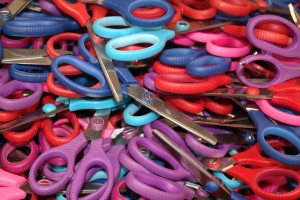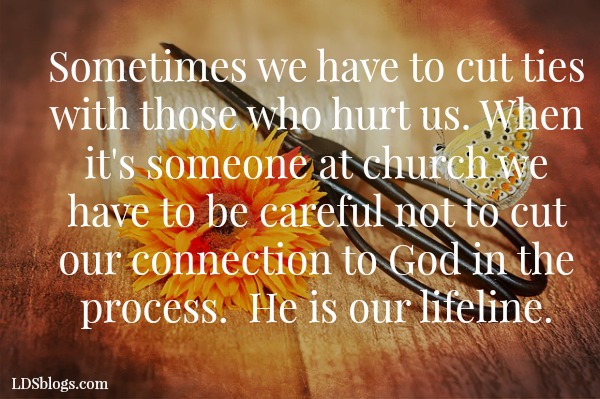If I cut you off, chances are, you handed me the scissors. —Unknown
I wish I could give credit to whoever said that, but I can’t find the original source. It must have resonated with a lot of people, however, because it is all over the internet lately.
I’d like to look at this quote from different perspectives.
 If a friend were to turn on me, say bad things about me, and become disloyal, I would consider that I were being handed the scissors to cut the cord of the friendship. While I have the responsibility to forgive, I don’t have to sit around and take continual abuse. We sometimes think that to forgive someone means just that, and it simply is not true. That is akin to saying that an abused spouse has to stay in the abusive relationship in order to qualify as a forgiving person. First, get out of the abuse; then forgive.
If a friend were to turn on me, say bad things about me, and become disloyal, I would consider that I were being handed the scissors to cut the cord of the friendship. While I have the responsibility to forgive, I don’t have to sit around and take continual abuse. We sometimes think that to forgive someone means just that, and it simply is not true. That is akin to saying that an abused spouse has to stay in the abusive relationship in order to qualify as a forgiving person. First, get out of the abuse; then forgive.
I feel the same way about social media. I have made some wonderful friends on social media and have rarely cut ties with anyone I’ve met. There have been a few times, however, when I found it necessary in order to keep my life from becoming a total bag of stress. A couple of those people I cared enough about to follow up with mutual friends from time to time to make sure they were okay. Sometimes you need to protect yourself from hurtful or painful things, but you still have to forgive.
Now, let’s turn this around and view this from another angle. What is the appropriate response when the people who hurt you or your loved ones come from within your own religious community? We know the story all too well. Someone gets their feelings hurt at Church and stops coming. I have personal experience with this, as after being hurt more times than I could count, I walked away for 20 years.
 Many people—not just one person—handed me scissors, and eventually I cut them off. Or did I? Looking back, I see a whole different scenario than I saw way back then. Yes, they handed me the scissors, and yes, I cut the cord—to my own lifeline. Not only did I cut myself loose, but I cut my family loose. While I managed to marry within the Church (a true miracle), and while I allowed my husband to take the children to Church, there were many years that my children did not have an example of what an LDS family should look like. We had a wonderful family, talked about spiritual things, but they didn’t have the benefit of seeing their mother in Church, magnifying callings, or setting a good example. They never witnessed their mother publicly bearing testimony. More importantly, they spent many years without the benefit of being sealed to their parents in a holy temple.
Many people—not just one person—handed me scissors, and eventually I cut them off. Or did I? Looking back, I see a whole different scenario than I saw way back then. Yes, they handed me the scissors, and yes, I cut the cord—to my own lifeline. Not only did I cut myself loose, but I cut my family loose. While I managed to marry within the Church (a true miracle), and while I allowed my husband to take the children to Church, there were many years that my children did not have an example of what an LDS family should look like. We had a wonderful family, talked about spiritual things, but they didn’t have the benefit of seeing their mother in Church, magnifying callings, or setting a good example. They never witnessed their mother publicly bearing testimony. More importantly, they spent many years without the benefit of being sealed to their parents in a holy temple.
This is a complicated issue. I would give my right arm to get back the 20 years that I lost. I feel like I’m 20 years behind in my spiritual progression. I cheated my children out of experiences they should have had in their own spiritual progression. I’m very blessed that my children all stayed active, served missions, and married in the temple for time and all eternity. Things could have turned out much differently.
Where does this leave us? Should a person continually submit themselves and their loved ones to constant abuse and hurt week after week? I don’t think that’s a healthy situation. Using the scissors to cut the cord isn’t the answer either. I can’t speak to the experiences of other people; I can only speak to my own life. Hindsight is always 20/20. Looking at my own life, there are some things I could have done that would have made the situation better. I was very young when handed the scissors, and had I been a little older with more life experience under my belt, maybe I would have handled things better.
If the situation were to happen today, here’s what I would do.
- Find my voice. I would speak out to those who hurt me and stand up for myself instead of internalizing until my breaking point.
- Seek out the priesthood for help. Again, I reached the breaking point before speaking out about the issues involved.
- Drop the bitterness and realize that things change—faster than 20 years. In that time span, I had moved out of the ward, moved out of the city, married, and had children. Those who hurt me had moved on too. People had even passed away. Yet I remained bitter.
 Once more, I want to turn this around a little for a different perspective. It is important to understand that when people get their feelings hurt and leave, we must first look at ourselves and our behavior. So often we play the blame game, or the name-calling game, or the denial game. We blame the person who uses the scissors instead of ourselves for handing the scissors over. We label them as people without testimonies, or people who have lost their testimonies. We call them inactive instead of calling them friends and reaching out to help. The clincher—we deny the possibility that it could have been us that handed them the scissors in the first place. We look to someone else in the congregation as the offender, or worse, we deny there is an offender at all.
Once more, I want to turn this around a little for a different perspective. It is important to understand that when people get their feelings hurt and leave, we must first look at ourselves and our behavior. So often we play the blame game, or the name-calling game, or the denial game. We blame the person who uses the scissors instead of ourselves for handing the scissors over. We label them as people without testimonies, or people who have lost their testimonies. We call them inactive instead of calling them friends and reaching out to help. The clincher—we deny the possibility that it could have been us that handed them the scissors in the first place. We look to someone else in the congregation as the offender, or worse, we deny there is an offender at all.
First and foremost, we are all children of God. We must begin to act like it. We must begin to build relationships instead of egos. Once we remove the egos, we will begin to build a Zion community. Don’t be the person who hands someone the scissors. If handed the scissors yourself, resist the temptation to cut the cord. Seek help from your priesthood leaders. Seek priesthood blessings. Seek help from the Lord. Use the atonement. Put the scissors back in their case.
About Tudie Rose
Tudie Rose is a mother of four and grandmother of ten in Sacramento, California. You can find her on Twitter as @TudieRose. She blogs as Tudie Rose at http://potrackrose.wordpress.com. She has written articles for Familius. You will find a Tudie Rose essay in Lessons from My Parents, Michele Robbins, Familius 2013, at http://www.familius.com/lessons-from-my-parents.
Twitter •







